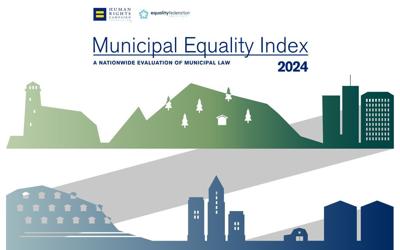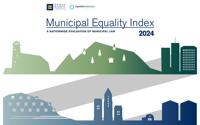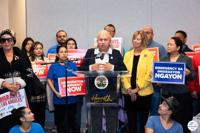The City of West Hollywood received the highest score of 100 on the Human Rights Campaign’s 2024 Municipal Equality Index. The MEI is an evaluation by the HRC of over 500 cities across the United States, measuring a city’s laws, policies and available resources for LGBTQ+ people.
This rating is done using a scorecard that factors in non-discrimination laws, employment opportunities and protections, municipal services, law enforcement and leadership on LGBTQ+ equality.
“Even when anti-LGBTQ+ extremists in state capitals are working to undermine their progress, mayors and city council members keep fighting to make sure that LGBTQ+ people in their communities – especially trans people – are supported and lifted up to the fullest extent possible,” said Kelley Robinson, president of the HRC. “This year’s Municipal Equality Index shows the results of their dedication, while acknowledging the increasingly hostile environment in which they must govern.”
In addition to the score of 100, the city received flex score points in recognition of specific services such as those for LGBTQ+ youth, seniors and people lacking basic needs. Available services for people living with HIV/AIDS jumped to 134 cities nationwide, 83 cities for LGBTQ+ people experiencing homelessness, 78 cities with services for LGBTQ+ older adults, 163 cities with services for LGBTQ+ youth and 97 cities with services for transgender and transsexual people.
A city’s MEI score is based on non-discrimination laws, protections, its recognition of relationships, fairness and inclusiveness in employment opportunities and resources catered to LGBTQ+ people.
The MEI is done in partnership with the Equality Federation Institute, which partners up with LGBTQ+ organizations nationally.
“This year, a record-breaking 130 cities — over 25 percent of all MEI-rated cities — earned the highest score of 100. What is even more remarkable is that in 20 states across the country, 76 cities earned over 85 points despite hailing from a state without a nondiscrimination statute that explicitly protects LGBTQ+ people,” said Fran Hutchins, executive director at the Equality Federation Institute.
During 2024, a record-breaking amount of anti-LGBTQ+ legislation was proposed and approved at all levels of government. LGBTQ+ Americans across the country have felt the effects of the legislation, which has affected and impacted schools, families and the municipalities that are essential building blocks of the U.S.
Despite the continued anti-LGBTQ+ legislation attacks against the municipalities that have taken proactive steps to protect LGBTQ+ rights, freedoms and establish protections, many cities such as West Hollywood continue to lead and pave the way for equality.
In its thirteen-year history, 2024’s index recorded the highest all-around city average and a record number of cities to receive a 100-point score.
Some key findings do point to the loss of points in some cities in 2023, due to the anti-LGBTQ+ legislation in some cities across the country.
According to the MEI report, more cities than ever have taken steps to protect the most vulnerable populations, with over 10 percent of MEI-rated cities taking action against these harmful laws, nearly doubling over the last five years.
Other figures include a new all-time high national average of 72 points.
For more information on the report, its findings and scoring criteria, visit the HRC’s website or find the full report here.











(0) comments
Welcome to the discussion.
Log In
Keep it Clean. Please avoid obscene, vulgar, lewd, racist or sexually-oriented language.
PLEASE TURN OFF YOUR CAPS LOCK.
Don't Threaten. Threats of harming another person will not be tolerated.
Be Truthful. Don't knowingly lie about anyone or anything.
Be Nice. No racism, sexism or any sort of -ism that is degrading to another person.
Be Proactive. Use the 'Report' link on each comment to let us know of abusive posts.
Share with Us. We'd love to hear eyewitness accounts, the history behind an article.